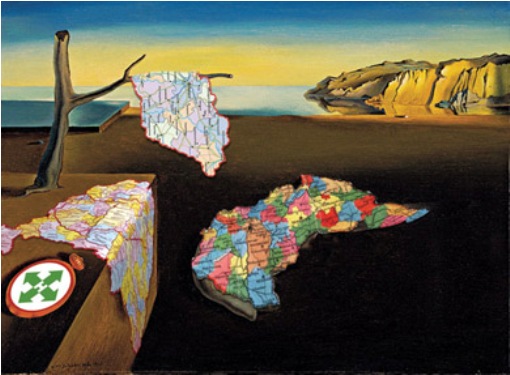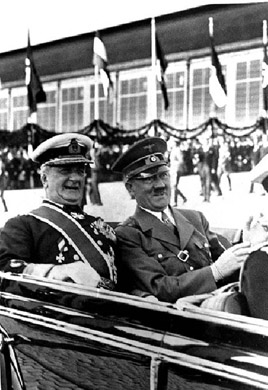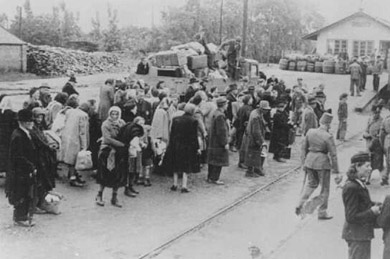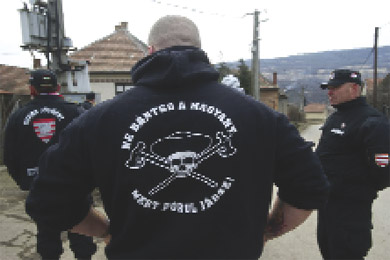by Richard Field
From THE BUDAPEST TIMES:
“Those who forget history are condemned to repeat it” – George Santayana
Each nation must come to terms with the darker chapters of its own history. For the United States such chapters include the genocidal destruction of Native American peoples, the deaths of millions of Indochinese, and more recently the death of over one hundred thousand Iraqi civilians.

White-washing history
One of the darkest chapters of Hungary’s history involved a Faustian pact between Admiral Miklós Horthy and Adolf Hitler (below) in which the latter supported the return to Hungary of much of the territory lost to Romania, Slovakia and Yugoslavia at Trianon in exchange for the former agreeing to adopt tough anti-Jewish measures. As Paul Lendvai notes in The Hungarians: A Thousand Years of Victory in Defeat, the Hungarian holocaust was remarkable for its ferocity and cruelty once the decision to deport Hungary’s Jews was made. Between May and July of 1944, 437,000 Hungarian Jews (mostly women, children, and

the elderly) were deported to Auschwitz where the vast majority were gassed on arrival. Able-bodied Jewish men between 18 and 48 were drafted into military labour service, many to be subsequently worked to death or murdered in cold blood.
Hungarians would like to believe the Final Solution was imposed on occupied Hungary by Nazi Germany, organised by the German Gestapo and executed by the German SS. But in fact it was undertaken by some 200,000 Hungarian public servants including police and gendarmes (Csendõr). Many of the victims were denounced to the authorities by gentile neighbours or subordinates hoping to be rewarded for their perfidy with their victims’ property and positions.
Under communism few East-central Europeans were forced to confront their nation’s complicity in the murder of their Jewish countrymen , many of whom had fought valiantly for king and country during the First World War. Taught that the two world wars were waged by capitalists on the working classes, the proletariat to which the vast majority of east-central Europeans was said to belong was absolved of moral culpability for crimes committed by their class enemies.

Jews being deported from the western town of Kõszeg in July, 1944.
A Hungarian tragedy
The magnitude of the evil visited upon the Hungarian Jews by their fellow countrymen defies comprehension. For a country like Hungary with precious little to feel good about in the 20th century, it is understandable why Hungarians would tend to exaggerate the role of the German “occupiers” in the systematic murder of a sizeable part of Hungary’s pre-war population. In their ignorance of what actually happened, growing numbers of Hungarians have come to share Jobbik spokeswoman Dóra Dúra’s view that the Holocaust was a Jewish tragedy, not a Hungarian tragedy, even though nothing could be farther from the truth.
Unlike the shetl Jews of Poland who lived in ghettos and spoke Yiddish (a dialect of middle German), Hungarian Jews were highly assimilated, spoke Hungarian, frequently adopted Hungarian surnames, adopted bourgeois Hungarians’ modes of dress and behaviour, inter-married with their gentile neighbours and often converted to Christianity. Many of those subsequently pressed into labour gangs and deported for being Jews had, in fact, been born and raised as Christians.
Masters or victims of their fate?
The subject of Hungarian complicity in the torture, deportation, and murder of Hungarian Jews is once again the subject of national debate, this time with regard to the proposed preamble to the new Constitution drafted by the governing Fidesz party, according to which Hungary was stripped of its powers of self-determination at the time of the German occupation.
In an interview appearing in the Sunday, 10 April edition of the left-leaning newspaper Népszabadság, Professor István Deák of Columbia University argues that, in fact, Hungary retained a high degree of autonomy despite the presence of several thousand German soldiers. Rather than insisting on Hungarian innocence, argues Deák, Hungarians should acknowledge their nation’s complicity in the crimes against the Jews but at the same time recognise the courage of countless Hungarians in hiding and protecting Jews. In his view, ordinary Hungarians behaved no worse than most other Europeans.
Many take issue with this position. However, as a young man living in Hungary at the time of the deportations, Deák’s assessment of Hungarian complicity cannot be disregarded. In his article “The Holocaust in Hungary” appearing in the The Hungarian Quarterly (Winter 2004), Deák writes that by the time the German army occupied Hungary on 19 March, 1944, some 60,000 Hungarian Jews serving in forced labour brigades had already died. Of the 760,000 Hungarian Jews remaining, “within three months… at least half of them were dead, in part because of the actions of the German occupation forces, but to an even greater part because of the actions of the same Hungarian authorities that, until March of that year, had protected the country’s Jewish population.” However, Deák also points out that “while we must assign responsibility for their death mainly to the government and people of Hungary, we must also credit the government and the people for the survival of the remaining one-third.”
Ignorance the root of all evil
Confusion and ignorance as to what actually happened in during the 1930s and 40s helps explain the nonchalance (if not bemusement) with which many Hungarians regard the meteoric rise of a rabidly ultra-nationalistic, xenophobic party, the so-called Movement for a Better Hungary (Jobbik) . Winning 17 per cent of the popular vote in last year’s parliamentary elections, Jobbik defines itself primarily in terms of opposition to Roma, Jews, multi-national companies, and other “foreign” elements. Like the national socialist parties of the 1930s and 1940s Jobbik seeks political power by exploiting and manipulating the anger and frustration of ordinary Hungarians and blaming Hungary’s problems on domestic and foreign “enemies.”
The past month has witnessed a series of Jobbik demonstrations in towns with sizable Roma populations. In the case of Gyöngyöspata, hundreds of uniformed paramilitaries occupied the town for 16 days while members of various hate groups (below) threatened Roma inhabitants with whips and dogs. As I write this a similar demonstration is underway in the eastern town of Hajdúhadház, a town with a significantly larger Roma community than Gyöngyöspata. Inexplicably, local police are permitting this despite a recent agreement between Minister of the Interior, Sándor Pinter, and State Secretary for minority affairs, Zoltán Balog supposedly precluding such racially motivated attacks on minority communities from taking place.

Itching for a fight
The siege of Hajdúhadház coincides with commemorations held last Friday and Saturday for Holocaust Remembrance Day (April 16). Some 50,000 Hungarian Roma were murdered during the Second World War, many of them at the hands of Hungarian Fascist Arrow Cross vigilantes whose insignia – four green arrows pointing to the four points of the compass – frequently appears on the uniforms of Hungary’s numerous extremist hate groups.
Recent statements on the part of Jobbik leader Gábor Vona make it perfectly obvious that Jobbik’s goal is to provoke Hungary’s Roma into forming their own civil defense organisations. In this case Vona believes that it is merely a matter of time before Roma vigilantes clash with Hungarian paramilitaries and ordinary Hungarians are forced to take sides. Needless to say, all of this smacks of reckless brinkmanship and only serves to further besodden Hungary’s international reputation and discourage foreign investment at a time when it is urgently needed.
What goes around, comes around
One cannot help but believe that were the Hungarians less ignorant and more honest about their history, there would be far greater public outcry against recent outrages perpetrated against Hungary’s Roma by the various successor organisations to the banned Hungarian Guard. Instead, the majority of Hungarians react with indifference if not outright apathy.
If a nation is judged by how it treats its minorities, then the generation of Hungarians presently running the country (some would say into the ground) risks being judged very harshly indeed. When will the Hungarian people finally learn that what is sauce for the goose is sauce for the gander, and that one cannot expect the civil liberties and human rights of Hungarian minorities living in its lost territories to be respected if Hungarians do not respect the civil liberties and human rights of national, ethnic, and religious minorities at home?
Viewing the past through rose-coloured glasses
If an otherwise well-educated and intelligent people behaves so foolishly at times, it is due in part to the persistence of selective memory. The Hungarians suffer from a kind of collective amnesia. Facts that are inconsistent with their perception of themselves as a nation are discarded and replaced with myths often having little basis in reality. There is an obvious psychological need on the part of young Hungarians to believe that Admiral Miklós Horthy was a great Hungarian and a great leader. While there is no reason to question Horthy’s patriotism or his honesty, his actions proved ruinous, resulting in the death of close to a million Hungarian civilians (including 290,000 of non-Jewish descent), hundreds of thousands of Hungarian soldiers, the physical destruction of much of Budapest and surrounding countryside, and the occupation and subsequent political subjugation of the Hungarian people by the Soviet Union.
Admiral Horthy deserved to be tried for crimes against humanity if for no reason other than Hungary’s illegal invasion of Yugoslavia shortly after the two countries concluded a “treaty of eternal friendship.” This act of infamy induced Hungarian prime minister Pál Teleki to commit suicide, writing in his suicide note to Horthy that “we shall become the despoilers of corpses, the most abominable of nations!” Horthy’s decision not to resist the German invasion of Hungary so that his son (whom the Germans had kidnapped) might live was not the act of a great Hungarian patriot, but that of a despicable coward.
Horthy’s decisions were informed by a warped understanding of Hungary’s history distorted by the forces of 19th century nationalism. Twentieth century Hungary was (and remains) an amalgamation of peoples settling in the Carpathian basin over the country’s 1,100 year long history. There is much about their history the Hungarian people can be proud of (I always make a point of showing all my guests the M1 metro line and the Keleti (East) station, continental Europe’s first underground railway and covered railyard, respectively). However, if Hungarians are to learn anything from their history, they must begin with an accurate, honest assessment of the recent past. Otherwise, as Gordon “Sting” Sumner is likely to remind his Hungarian audience when he performs here later this year, “history will teach us nothing.”


I have just finished reading your excellent article in the Budapest Times and congratulate you on your scholarship on the history of Hungary over the past seventy five years and your insight into the rise of ethnic hatred as a means of achieving political control in today’s Hungary. It takes a lot of guts to speak out so publicly as you have done and you have my highest admiration for having done so.